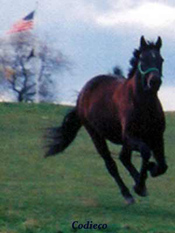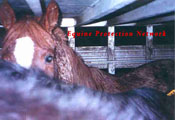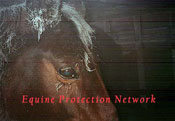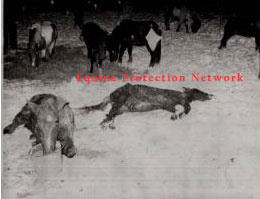
Join the EPN Announcement Only Mailing List
Shop for CD's at CDRush.com & the EPN Benefits!
Put "EPN" in the Coupon Code box when you place your order.
Now you can save money on your favorite music and help the horses at the same time!
EPN Website Sections
Press Stories 1980-2004
Caution Horses For Slaughter
by Heather Chapin-Fowler of the Corral Staff
The Final Roundup Pittsburgh Magazine 5 /2004
Fighting to Stop the Sale & Slaughter of US Horses in Foreign Countries - KDKA TV Investigates 4/30/2004
The Slaughter Question Horse & Rider 12/2002
State Ranks High in Equine Slaughter WTAE's Paul Van Osdol Reports 4/27/2001
Slaughterhouse Ride WISH TV News 8 I-Team Investigative Report 4/2001
Illinois Defeats Horse Slaughterhouse! 1999
Kill Sale Pittsburgh Post Gazette 6/ 1999
Horses To Slaughter
Police, vet check horses' health at New Holland sale
July 1998
PA Horse Transport Legislation - Act 64 of 2001
Horse Transport Bill Passes Unanimously WTAE's Paul Van Osdol Reports 6/21/2001
State Lawmakers Urged to Protect Horses en route to Slaughterhouses
June 1998
State Concerned with Cruelty to Horses Taken for Slaughter
'TRAIL OF TORTURE' ?
June 1998
Horse-Slaughter Industry Critics Pushing Changes
PA. Bill Would Help Protect Horses Headed to Slaughter
March 28, 1998
The goal is a humane trip for horses on the way to be killed for their meat, prized in Europe.
New York Does PA's Dirty Work January 1998
NYSP Stop Double Deck Trailer

Horses inside double deck cattle trailer stopped by the NYSP. The owner was later convicted & fined $3000.00.
Horse Popsicle Case 1994
Cruel Transport Results in $11,100 Fine

Horses inside double decker covered with frost.
The Last Ride
Eyewitness Account of trip to Slaughterhouse
Overcrowding, negligence plague Shelby horse feedlot
Great Falls Tribune 8/10/2003
The Torture Trail
December 1980
85 horses in trailer, 57 survive

A dead horse lies in the snow, while another too weak to rise eats from a bucket.
The Miracle Mile July 1990
Pregnant Mare Foals Hours After Rescue From Slaughterhouse-
Foal is a Stakes Winner!
 Pasturemate of the Stakes Winner, "On Route 66" who was born only hours after her dam was taken from a slaughterhouse
Pasturemate of the Stakes Winner, "On Route 66" who was born only hours after her dam was taken from a slaughterhouse
PA Dealer Sent to Prison 1999
Shady Horse Dealing
Renaissance Bob 12/ 1998
Rescue of a Racehorse
An Eye For An Eye
Story of Catch-22

Links
California Voters "Just Say Neigh" to Horse Slaughter!
HoofPAC
Shop online at IGive.com with over 600 great stores you know & love- including Back In the Saddle! Up to 26% of the purchase price is donated to the EPN!
The EPN gets $5 extra the first time you shop!
PayPal accepts credit cards! Please send your tax deductible donation to the:Equine Protection Network, Inc.,
P. O. Box 232, Friedensburg, PA, 17933.
HoofPAC is the political action committee that has been formed to end the slaughter of America's horses. Cathleen Doyle, founder of HoofPAC, led the successful Save The Horses campaign in 1998 that made the slaughter of California's horses a felony.
Did You Know?

Equine Slaughterhouse Voted Down in Illinois
Libbye A.M. Belgrade
The McHenry County Board in Illinois voted "no" this spring to a European company that wanted to convert a 2.4-acre cattle slaughterhouse into an equine slaughterhouse. News of the public debates and pending vote spread quickly, generating phone calls and faxes from all over the United States from people who opposed the slaughterhouse.
A Belgian company, Velda Group, and its subsidiary, Cavel International, petitioned the McHenry County Zoning Board for a conditional use permit to reopen the Big Foot Cattle Co. as a horse slaughterhouse and packing plant. The cattle slaughterhouse operated from 1958 until the fall of 1998.
The tiny town of Big Foot, Ill., home to 85 residents, nestles the Wisconsin border on U.S. Highway 14. Rejecting the slaughterhouse meant turning down 40 potential new jobs for the area and a potential investment in the site of $1 million that the Velda Group promised. Velda operates almost a dozen horse slaughterhouses worldwide. The company sells horsemeat to restaurants in Europe, where horsemeat is considered a delicacy. Human consumption of horsemeat is prevented in this country by both regulations and a culture that disapproves of eating companion animals. Illinois has outlawed human consumption of horsemeat since the 1950s.
According to Jim Hoag, Principal Planner in McHenry County, five public hearings were held on the issue to give people an opportunity to question the petitioners and to voice opinions. The hearings were crowded, and opposition was strong. Testimony summary from the debates listed the reasons that people gave for opposing the slaughterhouse:
Generally, the public spoke against the request because of concerns including the appropriateness of the intended use, lack of economic benefit to McHenry County, theft of local horses, offensive odors, humane treatment of animals, wastewater concerns, property value reduction in the area and traffic concerns.
Despite the strong outpouring of opposition, Hoag says that that wasn't the primary reason the Board voted the slaughterhouse down.
The public outcry might have contributed a little, Hoag comments. But the property had been a slaughterhouse for forty years. It was a small site, with truck traffic bringing animals to slaughter and to take the product away. The smallness of the site for storage was really the biggest consideration.
Vienna Beef LTD and Luc Van Damme were to own the property, but the plant was to be run by Pascal Verde, the general manager of Cavel International. Van Damme's attorney, Brett Brown, and Verde presented their case for the slaughterhouse at the public hearings. They stated that the site had sufficient parking for employees and incoming trucks. Brown had Hy Ramis take the stand. Ramis was the president and manager of the Big Foot Cattle Company for 10 years. He said that, during his decade of management there, he received very few complaints about odor. He also testified that a wastewater treatment facility was installed at the plant four years ago and that it is monitored by the Illinois Environmental Protection Agency and the U.S. Department of Agriculture.
The seven-member McHenry Zoning Board then voted on the issue, making a unanimous recommendation to the 24-member McHenry County Board to deny the conditional-use permit. The County Board voted it down, too, by a vote of 22 to 1. Its members agreed with the County Zoning Board of Appeals that Velda had failed to meet most of the requirements of conditional use and failed to show how a horse slaughterhouse is in the public interest of McHenry County, which, according to the Chicago Tribune, has the largest horse population in Illinois.
Many residents felt that it was no accident, then, that Velda Group and Cavel chose the Big Foot site for a horse slaughterhouse. According to the testimony summary, however, Velda Group officials stated that they chose the site not because it was in the part of the state that had the most horses but because it was a slaughterhouse previously and because of its convenience to O'Hare International Airport.
Only four horse-slaughtering facilities exist in the United States. One of them is in DeKalb, Ill. Cavel's general manager, Verde, runs the DeKalb plant and had hoped to move the horse-packing operation from the DeKalb site to the Big Foot site. Now that their request was denied, Cavel will continue to operate the DeKalb slaughterhouse.
Besides the company officials, only one person spoke out in favor of the slaughterhouse. G.J. Doc Iverson, a recently retired veterinarian from Harvard, Ill., says he was disgusted by the emotional, illogical reaction of those who protested the Velda Group's request.
It was just one stupid, idiotic plea after the next, Iverson said, referring to those who opposed the slaughterhouse on the basis that companion animals shouldn't be used for food.
These people had the same vigor and, in my opinion, ignorance, as the people starving in India, with their sacred cattle right there that they refuse to eat, Iverson says. It is no more inhumane to use that place as a slaughterhouse for horses as it is for pigs, sheep or cattle. And as long as people are starving in this world, I just don't see the logic in it. Iverson, who says that McHenry County has the second-largest horse population in the United States, scoffs at the idea that taking a horse to slaughter denies the horse the ability to die with dignity.
I'll tell you about dying with dignity, he says, and he tells about a woman he once knew who wanted to move to Florida but couldn't take her five horses with her. He says that she paid him a total of $900 to euthanise the five horses when she could have easily made $1,000 for each horse if she had taken them to a slaughterhouse. And they still didn't die with dignity, he contends.
She paid me eighty dollars apiece to blue-juice them, plus a hundred dollars each to put 'em on the rendering truck, Iverson recalls. So the rendering truck came along, and they threw the dead horses on top of some dead, bloated cows to be taken away. You call that dying with dignity?
Chris Berry, a long-time horseperson who has worked for a leading transport company, says that she opposes the idea of equine slaughter because of the inhumane treatment the horses receive en route.
When you're in the back of a trailer with those horses for 265 days out of a year, you learn what it's really like, Berry says. As a horseman, I think it's appalling that we allow this to continue.
Berry started a grassroots advocacy group to raise awareness about inhumane transport of horses. She lives in Pennsylvania but was alerted to the Illinois slaughterhouse issue by other horse-advocacy people.
Contrary to popular belief, Berry says, taking an aging horse to a slaughterhouse does not end their suffering in fact, it's only the beginning. An undercover video that she obtained shows the horses being whacked in the head, Berry says, and they urinate and defecate on themselves. Often, horses are kept in 57-inch-high cattle trailers days at a time, without sufficient food or water, while being transported to slaughterhouses that are hundreds of miles away, she says. Many have broken bones and other injuries that inspection agents conveniently fail to note on their paperwork, Berry says, and the slow, painful journey to the slaughterhouse, with little food and water, can last for weeks or even months. Horse owners need to be educated about the responsibilities associated with owning companion horses, Berry says.
People will say,
I have a 15-year-old horse, but he needs bar shoes and some bute, and he can only trot.
So they don't want to keep him. Well, if you love that horse and you don't even want him, then what makes you think someone else will want him and take care of him? If you can't afford to care for the horse and the sanctuaries are full, then the responsible thing for you to do is to euthanise the horse.
Donna Ewing, president of Hooved Animal Humane Society, lives in Woodstock, Ill. She agrees that people need to be educated about their responsibilities to provide a quality life and a humane death to their companion horses.
She also has witnessed the inhumane transport that Berry talks about.
Anytime you put a new horse into a herd, like they do on these trucks, the new horse gets practically beaten to death by the other horses. And that's when his journey of terror begins, Ewing states. They may stand for a week or two, maybe a month, to be taken to a sale barn. Then they'll stand in corrals and stalls with more strange horses, and the chances are tremendous that they'll get bitten or kicked. Then there's more terror as the horses are taken to the killer buyer's home.
Ewing opposed the Velda Group's equine slaughterhouse because she says the facility's holding pens are too small to accommodate horses and because the site is visible from the road. She says that, because she didn't reject the idea of the slaughterhouse on mere principle, she received much criticism at the public hearings in Big Foot and continued to receive phone calls after the meeting. She left the meeting because people were blinded by emotion. They were making irrational comments. They had not thought things out clearly. Months later, she comments, I have to stand by what I said.
At the hearing, Ewing had described equine slaughter as a necessary evil. And, as much as she would hate to see it, she said that a more humane approach would be to have a state-of-the-art USDA-approved equine slaughter facility located in the center of every state so that the horses would spend a minimum amount of time being transported. In an approved facility, Ewing says that each horse is placed in a controlled area, and a retractable bullet is directed at a certain spot of the horse's brain, causing instantaneous death. It's much more humane than injections, which sometimes take up to half an hour to work, she says. It's also more humane than letting the horse die slowly from its ailments.
As a horsewoman for more than 30 years, Ewing says that she has witnessed many agonizing, inhumane horse deaths.
The circulatory system in older horses doesn't work well, so sometimes it takes twenty minutes or half an hour for the horse to die, Ewing notes. They're flailing around on the floor, crashing their heads repeatedly on the floor, trying to get up. Sometimes they'll even run away. After that, they go through unspeakable suffering. Now, that's just prolonging the agony of death.
What she has seen at some slaughterhouses and elsewhere haunts Ewing to this day, but she says that if you're going to talk about it, then you have to witness it. She also says that approved slaughterhouses that are run according to federal regulations are much more humane than many alternatives.
We have been put on this Earth as stewards of the animals,Ewing states.
It is our responsibility to give them a dignified exit.
Save America's Horses!
|
||||

